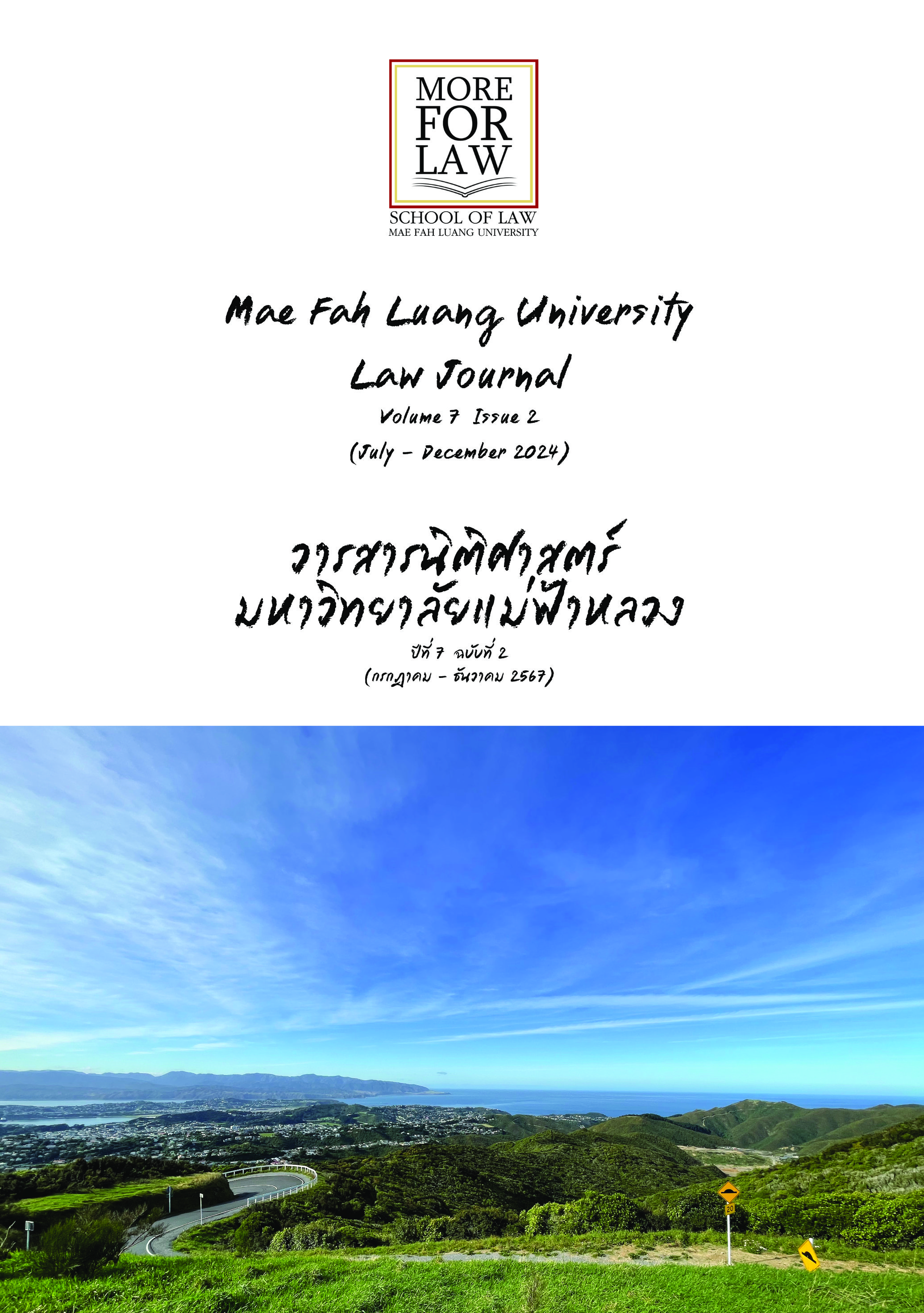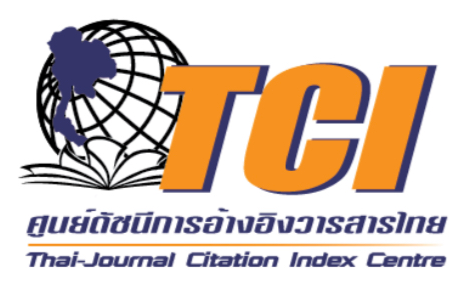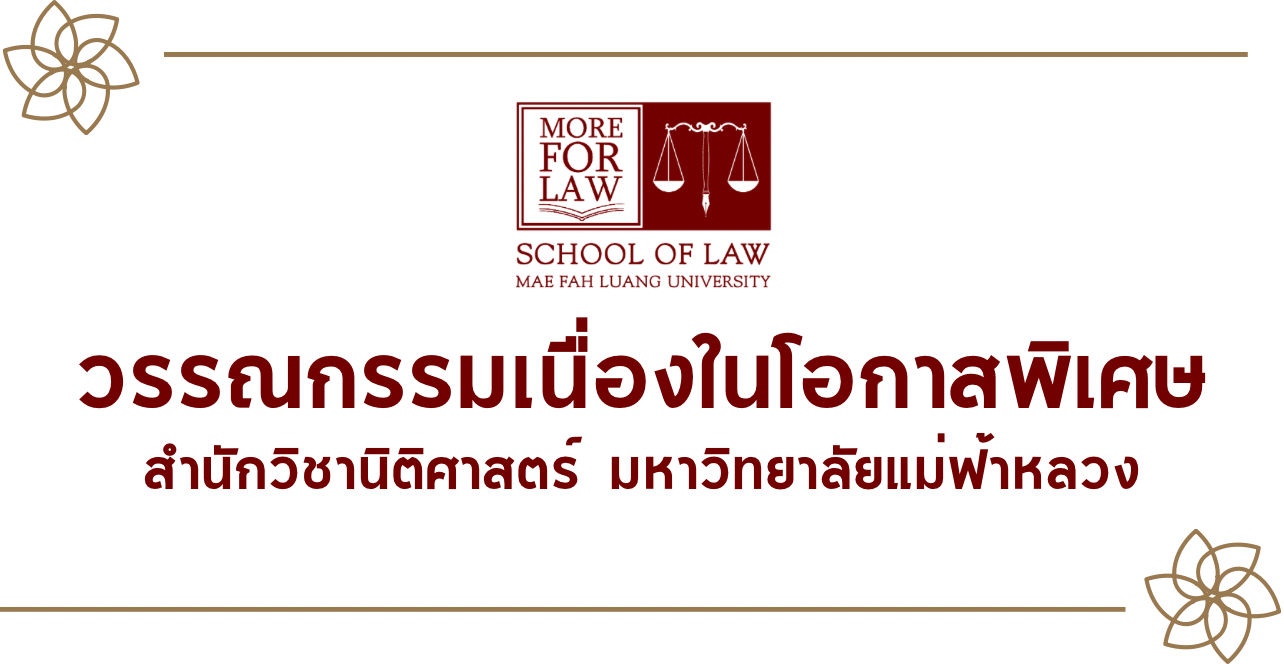Exceptions Regarding Actions that Are not Included Under the Jurisdiction of the Thai Constitutional Court
DOI:
https://doi.org/10.14456/mfulj.2024.16Keywords:
Exceptions, Constitutional Complaint, Constitutional Court, Constitutional JurisdictionAbstract
The exceptions to actions that are not included under the Constitutional Court's jurisdiction in the constitutional complaint system established by article 213 of the Constitution of the Kingdom of Thailand B.E. 2560 and article 47 of the Organic Act on Procedures of the Constitutional Court B.E. 2561, provides exceptions to acts that are outside the Constitutional Court's jurisdiction. The topic under consideration can be categorized into two distinct groups: exceptions pertaining to direct action, and exceptions associated with the action. Based on research conducted in various countries, it has been observed that there exist certain exceptions to constitutional complaint systems that fall outside of the jurisdiction of the Constitutional Court. Nevertheless, it is crucial to note that there are three significant differentiations: To begin with, the legal terminology employed to establish a provision for direct actions will be characterized by explicitness and precision; Furthermore, it should be noted that the exception pertaining to the exhaustion of legal remedies is not an absolute one. However, a certain equilibrium will exist that will enable the court to entertain specific types of cases essential for the protection of individuals' fundamental rights, even in instances where the complainant has not fully exhausted all available legal remedies. Additionally, it is important to note that certain exemptions from direct actions in Thailand differ from those found in foreign jurisdictions.
The comparative analysis has identified significant issues with the inclusion of exemptions in the Thai constitutional complaint system, which can be attributed to the existing legislation. These problems are outlined as follows: (1) An issue pertaining to the provisions of the law lies in the extensive scope of exemptions, which encompasses a significant majority of state actions; (2) The issue of implementing unconditional exemptions without due consideration for safeguarding the inherent rights of individuals, along with the challenge of formulating exceptions using ambiguous terminology; (3) The problem of interpreting the court's law, specifically interpreting articles 47 (2), 47 (3) and 48 of the Organic Act on Procedures of the Constitutional Court B.E. 2561 (2018) and preventing the Constitutional Court from protecting the rights and liberties of the people and constitutional defenders as required by the Constitution.
This article presented three recommendations, with their first suggestion being the proposal of interpretation guidelines for article 47 of the Organic Act on Procedures of the Constitutional Court, B.E. 2561 (2018). Furthermore, this response aims to suggest a set of guidelines that can be employed when applying the provisions outlined in Article 47 for the purpose of evaluating the application. In addition, it is recommended to lay out a set of principles for enhancing articles 46 to 48 in alignment with the legislation. This is aimed at encouraging coherence and consistency within the framework of the constitutional complaint examination system, while enabling the Constitutional Court to effectively safeguard the constitutionally guaranteed rights and freedoms of the populace in accordance with the original intent of the Constitution, and with optimal efficacy.
Downloads
References
เกรียงไกร เจริญธนาวัฒน์, การกระทำทางรัฐบาล : ศึกษากรณีเปรียบเทียบระหว่างประเทศไทย สาธารณรัฐฝรั่งเศส สหพันธ์สาธารณรัฐเยอรมนี สหรัฐอเมริกา และอังกฤษ, สำนักงานศาลรัฐธรรมนูญ (กรุงเทพมหานคร: 2554).
ต่อพงศ์ กิตติยานุพงศ์, ศาลรัฐธรรมนูญเยอรมันกับหลักการจำกัดอำนาจตนเองของฝ่ายตุลาการ, วารสารนิติศาสตร์ มหาวิทยาลัยธรรมศาสตร์, ปีที่ 43 ฉบับที่ 1 (มีนาคม 2557).
นครินทร์ เมฆไตรรัตน์, อำนาจองค์กรตุลาการในมิติทางการเมือง : สำรวจความรู้ทางรัฐศาสตร์ร่วมสมัย, วารสารศาลรัฐธรรมนูญ สำนักงานศาลรัฐธรรมนูญ, ปีที่ 17 ฉบับที่ 50 (สิงหาคม 2558).
บรรเจิด สิงคะเนติ, การใช้สิทธิทางศาลของบุคคลซึ่งถูกละเมิดสิทธิ หรือเสรีภาพตามรัฐธรรมนูญมาตรา 28 ในกรณีที่ศาลมีคำพิพากษาถึงที่สุดแล้ว, สำนักงานศาลรัฐธรรมนูญ (กรุงเทพมหานคร: 2551).
บันทึกการประชุมคณะกรรมาธิการวิสามัญพิจารณาร่างพระราชบัญญัติประกอบรัฐธรรมนูญว่าด้วยวิธีพิจารณาของศาลรัฐธรรมนูญ พ.ศ. ...., สภานิติบัญญัติแห่งชาติ ครั้งที่ 7/2560 เมื่อวันศุกร์ที่ 20 ตุลาคม 2560.
มหาวิทยาลัยแม่ฟ้าหลวง, อำนาจของศาลรัฐธรรมนูญในการวินิจฉัยความชอบด้วยรัฐธรรมนูญของการกระทำตามรัฐธรรมนูญแห่งราชอาณาจักรไทย พ.ศ. 2560 มาตรา 213 และพระราชบัญญัติประกอบรัฐธรรมนูญว่าด้วยวิธีพิจารณาของศาลรัฐธรรมนูญ พ.ศ. 2561, สำนักงานศาลรัฐธรรมนูญ (กรุงเทพมหานคร: 2563).
รวินท์ ลีละพัฒนะ และชมพูนุช ตั้งถาวร, มุมมองใหม่ต่อการกระทำทางรัฐบาลในประเทศไทย : ศึกษาผ่านประวัติศาสตร์กฎหมายรัฐธรรมนูญ, (กรุงเทพมหานคร: สถาบันพระปกเกล้า, 2565).
วรเจตน์ ภาคีรัตน์, การร้องทุกข์ทางรัฐธรรมนูญในระบบกฎหมายเยอรมัน : วิเคราะห์เปรียบเทียบการฟ้องคดีโดยประชาชนต่อศาลรัฐธรรมนูญในระบบกฎหมายไทย, คณะกรรมการวิจัยและสัมมนา คณะนิติศาสตร์ มหาวิทยาลัยธรรมศาสตร์ (กรุงเทพมหานคร: 2553).
วรเจตน์ ภาคีรัตน์, คําสอนว่าด้วยรัฐและหลักกฎหมายมหาชน, พิมพ์ครั้งที่ 2 (กรุงเทพมหานคร: โครงการตําราและเอกสารประกอบการสอน คณะนิติศาสตร์ มหาวิทยาลัยธรรมศาสตร์, 2557).
สำนักงานเลขาธิการสภาผู้แทนราษฎร, ความมุ่งหมายและคำอธิบายประกอบรายมาตราของรัฐธรรมนูญแห่งราชอาณาจักรไทย พุทธศักราช 2560, (กรุงเทพมหานคร: สำนักงานเลขาธิการสภาผู้แทนราษฎร, 2562).
สำนักงานศาลรัฐธรรมนูญ, ‘ข้อยกเว้นเรื่องการกระทำที่ไม่อยู่ในอำนาจพิจารณาวินิจฉัยของศาลรัฐธรรมนูญตามมาตรา 47 และคำร้องที่ไม่เป็นสาระอันควรได้รับการวินิจฉัยตามมาตรา 46 วรรคสาม และมาตรา 48 วรรคสี่ แห่งพระราชบัญญัติประกอบรัฐธรรมนูญว่าด้วยวิธีพิจารณาของศาลรัฐธรรมนูญ พ.ศ. 2561’ ใน สรุปผลการสัมมนาโครงการสัมมนาประเด็นรัฐธรรมนูญระหว่างที่ปรึกษาและผู้เชี่ยวชาญประจำคณะตุลาการศาลรัฐธรรมนูญ, (กรุงเทพมหานคร: แอคทีฟ พริ้นท์, 2564).
สุรศักดิ์ บุญญานุกูลกิจ, สิทธิของบุคคลในการยื่นคำร้องต่อศาลรัฐธรรมนูญตามมาตรา 213 รัฐธรรมนูญแห่งราชอาณาจักรไทย พุทธศักราช 2560, คณะนิติศาสตร์ มหาวิทยาลัยธรรมศาสตร์ (กรุงเทพมหานคร: 2562).
อานนท์ มาเม้า อภินพ อติพิบูลสิน และสุรศักดิ์ บุญญานุกูลกิจ, สิทธิประชาชนฟ้องตรงต่อศาลรัฐธรรมนูญตามรัฐธรรมนูญปัจจุบัน, งานวิชาการรำลึก ศาสตราจารย์ ไพโรจน์ ชัยนาม ครั้งที่ 7, (กรุงเทพมหานคร: คณะนิติศาสตร์ มหาวิทยาลัยธรรมศาสตร์, 2561).
Allan R. Brewer-Carias, Constitutional Protection of Human Rights in Latin America : A Comparative Study of Amparo Proceedings, (New York: Cambridge University Press, 2009).
European Commission for democracy through law, Study on individual access to constitutional justice, Venice Commission, (Strasbourg: 2011).
Downloads
Published
How to Cite
Issue
Section
License
Copyright (c) 2024 Mae Fah Luang University Law Journal

This work is licensed under a Creative Commons Attribution-NonCommercial-NoDerivatives 4.0 International License.






